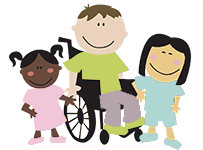How Do Speech & Language Disorders Affect Learning?
[vc_row][vc_column][vc_column_text]When children experience a speech-language disorder, their learning may be affected. This does not just mean learning at school, but general learning within the home and other environments, as well.
Ways Speech & Language Disorders Affect Learning
 A child diagnosed with a speech-language disorder, and especially a receptive language disorder, will have difficulty understanding and processing verbal information. When that information is presented in the form of something the child is to remember for home or school, it can be difficult for the child to even understand what was said, let alone the ability to remember it. The lack of ability to understand and remember verbal information or instructions correctly can significantly impact the child’s ability to complete tasks or assignments as expected. This can be very problematic when a child is given instructions. A child with a speech-language delay is likely to have difficulty following instructions, especially if the instructions are only given orally and if they contain multiple words and/or steps.
A child diagnosed with a speech-language disorder, and especially a receptive language disorder, will have difficulty understanding and processing verbal information. When that information is presented in the form of something the child is to remember for home or school, it can be difficult for the child to even understand what was said, let alone the ability to remember it. The lack of ability to understand and remember verbal information or instructions correctly can significantly impact the child’s ability to complete tasks or assignments as expected. This can be very problematic when a child is given instructions. A child with a speech-language delay is likely to have difficulty following instructions, especially if the instructions are only given orally and if they contain multiple words and/or steps.
In addition, children who have problems with speech-language skills may also have difficulty learning how to read and spell. Research has shown that verbal skills are very influential in developing reading skills. And children who have difficulty with verbal production need to be able to associate sounds with letters, and then segment those apart in order to successfully learn to read and spell. This skill can be especially hard for children who struggle with a speech-language disorder.
How to Help Learning for a Child Diagnosed with Speech-Language Disorder
To help children diagnosed with speech-language disorders remembering what was said and/or with following directions, it is best to break the information down into smaller chunks, with repetition as necessary until the child is able to encode all of the information. Having written information to accompany what is being said can also be very helpful to the child.
Sometimes children who have a difficult time with verbal information or instructions can be seen as less intelligent than they really are because they are not able to process the information as well as other students. This can lead to inappropriate placement in school settings. However, if the information is repeated or presented in an alternative way, the child may be able to perform on par with his or her peers. In addition, a child may be seen as ignoring what was said or even being defiant by not following through. This may lead to undue punishment, and this can be demoralizing to a child and discourage further attempts at learning. This is obviously not fair to the child, and it is important for parents, caregivers, teachers, and professionals who may be working with the child to advocate for understanding of the child’s problems with age-appropriate speech-language skills.
To assist with reading and spelling skills, it will be important for children to have repetition and practice with these skills. This can come with practice at home with parents and/or caregivers, or potentially special practice with tutors or special education services within the school system. Hopefully, children struggling with speech-language skills have been evaluated and are being treated by a speech-language pathologist who can assist the child’s caregivers and teachers with ways to best understand and help the child.
It is important for those caring for and working with children diagnosed with a speech-language disorder to understand that these potential difficulties with learning exist. These children need patience from the adults around them, understanding of their diagnosis, advocates to help get the services and accommodations they need, and encouragement that they are capable of learning.[/vc_column_text][/vc_column][/vc_row]
